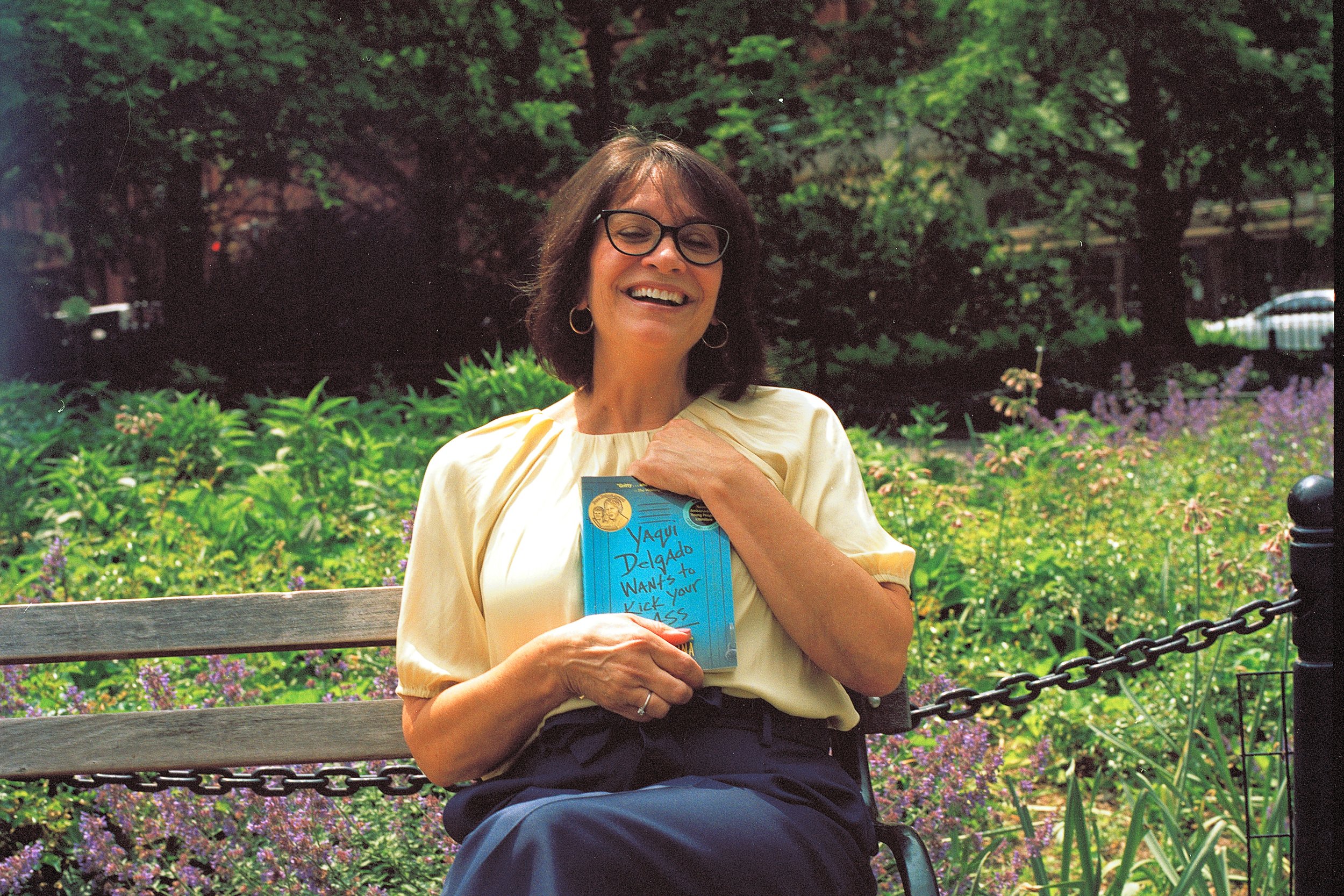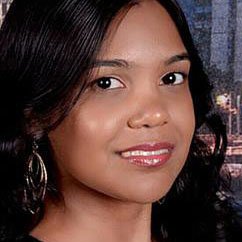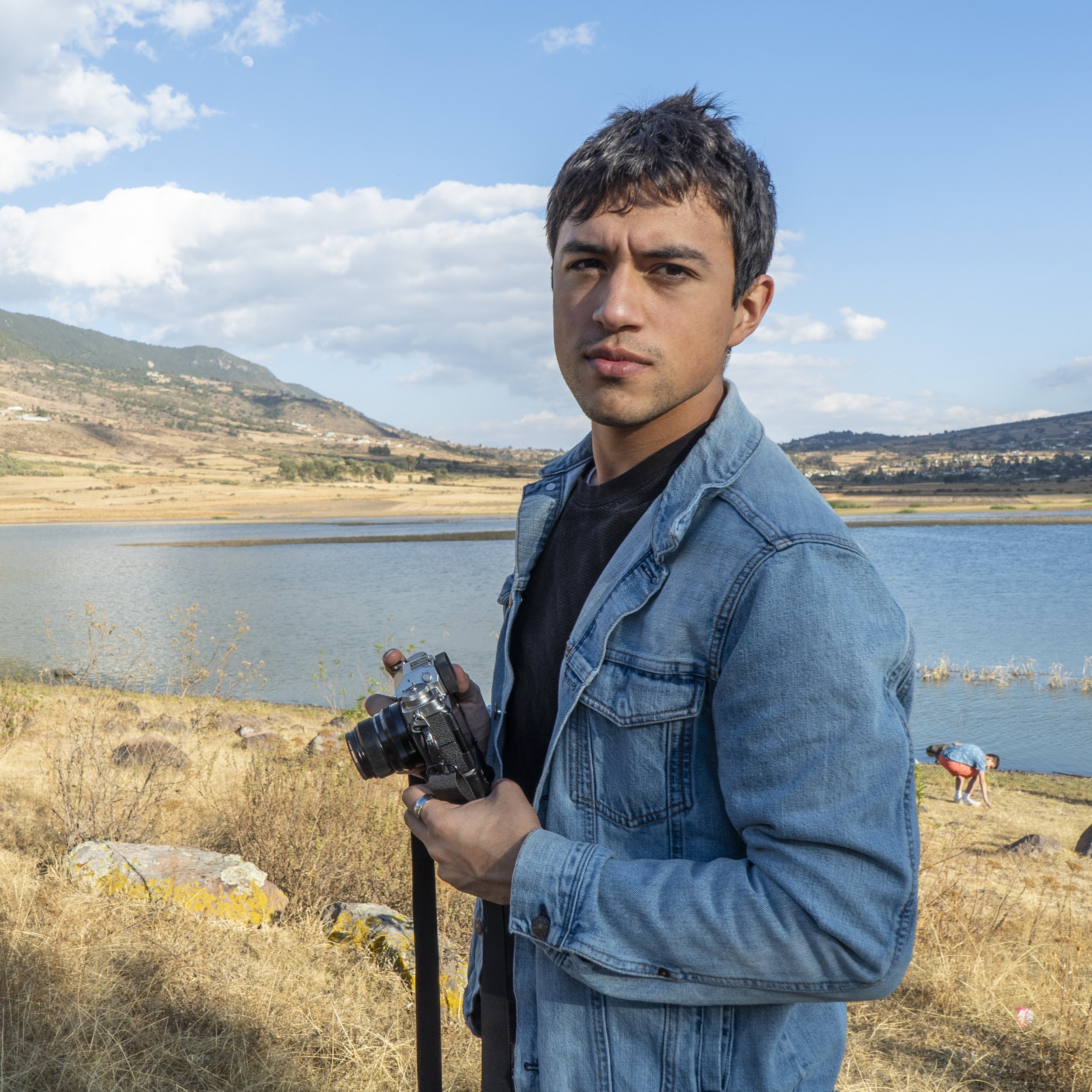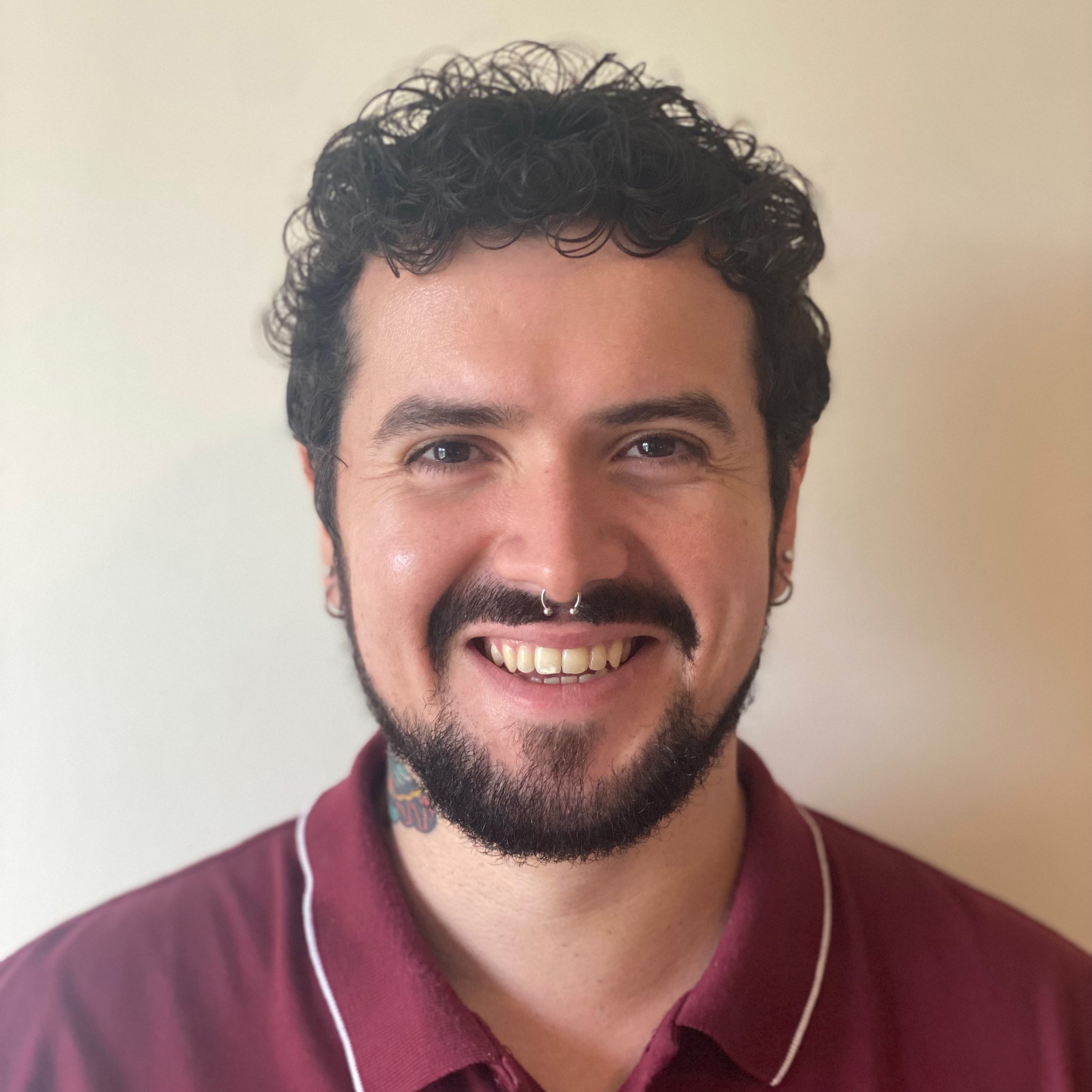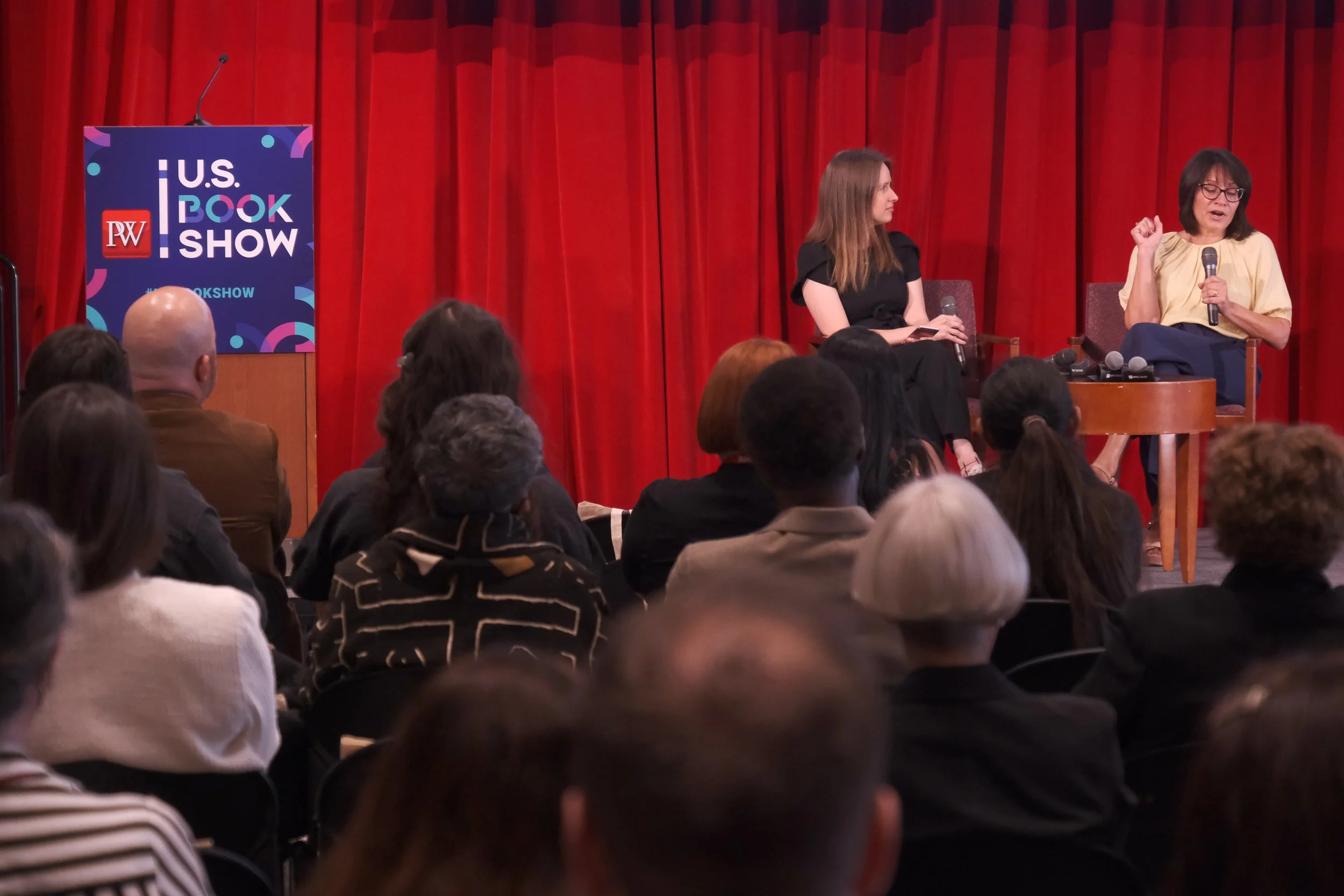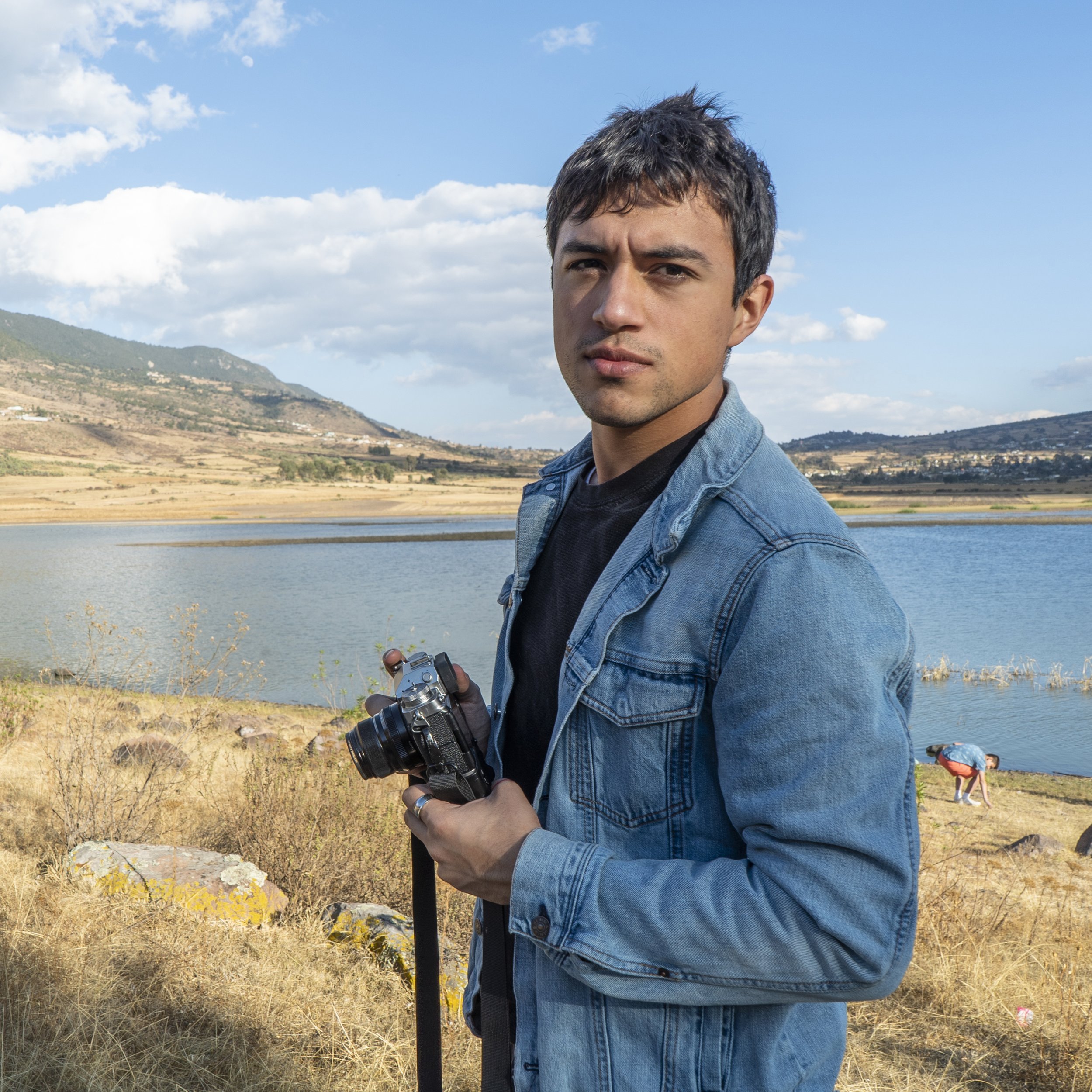Ambassador of Story
Meg Medina in Washington Square Park after her talk at the U.S. Book Show in New York City on May 24, 2023. She holds her 2013 young adult novel “Yaqui Delgado Wants to Kick Your Ass.” Photo by Ricardo J. Partida for palabra
Through the power of literature, oral storytelling and identity, Cuban American author Meg Medina, the National Ambassador for Young People’s Literature, invites children into the world of books
Haga clic aquí para leer el reportaje en español.
In January, acclaimed Cuban American author Meg Medina was named the eighth National Ambassador for Young People’s Literature. She is the first author of Latino heritage selected for the role, an honor established in 2008 by the Children’s Book Council, the Library of Congress and the nonprofit Every Child a Reader. The ambassador “raises national awareness of the importance of young people’s literature as it relates to lifelong literacy, education and the development and betterment of the lives of young people.”
During her two-year term, Medina will visit schools and libraries across the country to expand the rollout of her platform “Cuéntame: Let’s talk books,” which encourages dialogue about books among children, families and communities.
‘For Latino families and children, this is an opportunity for them to see that we can have rich literary lives, that our lives and our stories are part of the literary story of the United States.’
Medina was born in Virginia to Cuban parents and raised in Queens in New York City. She now lives in Richmond, Va. Medina has built a writing career around strong Latina protagonists in her work, which includes award-winning picture books such as “Evelyn del Rey Is Moving Away,” “Mango, Abuela, and Me,” and “Tía Isa Wants a Car,” the last of which won the 2012 Ezra Jack Keats Award, which celebrates new authors and illustrators of picture books that reflect multicultural diversity and the universal qualities of childhood.
Medina has also written young adult novels, like “The Girl Who Could Silence the Wind,” “Yaqui Delgado Wants to Kick Your Ass,” which won the 2014 Pura Belpré Award, and “Burn Baby Burn,” which was long-listed for the National Book Award in 2016. Medina also won the John Newbery Medal in 2019 for her middle grade novel “Merci Suárez Changes Gears,” which became the first book in a trilogy aimed at pre-teen audiences.
Medina at home in Richmond, Virginia on May 26, 2023. Photo by Carlos Bernate for palabra
Prior to becoming a children’s author, Medina was a freelance journalist and a classroom teacher, working with kids of all ages. In an interview with palabra, Medina reflected on a variety of topics, including Latino representation in children’s books, the value of embracing bilingualism in literature, navigating book bans and censorship, and how she’s using her platform to encourage discussion about books outside of the classroom.
The interview has been edited for brevity and clarity.
palabra: You’ve received many awards and accolades in your career. Where does being named National Ambassador for Young People’s Literature, and the first of Latino heritage, rank for you?
Medina: When you receive other kinds of book awards, it's lovely, certainly. You get a pretty seal on your book. People are more aware of your work. But you receive it without anything to do. When you are the ambassador, it's a little different. I think of it as being in service. You agree for two years to be in service to your country, and specifically to the children of this country.
I'm in service to all of the children in this country — I think it's 74 million. I'm happy to serve them. But I'm also keenly aware that for Latino families and children, this is an opportunity for them to see that we can have rich literary lives, that our lives and our stories are part of the literary story of the United States.
Medina in first grade. Photo courtesy of Meg Medina, via Library of Congress
palabra: What does that balance look like? How do you make sure that Latino kids feel represented while balancing that with “I’m an advocate for all kids.”
Medina: Rarely do I read a story outside of my own cultural heritage and say, “This is only for that group.” Almost always I could read a story written by anyone and say, “Oh, that feels familiar to my family, or that feels familiar to me. I know how that feels.” And so proceeding through that, always remembering that in the seats are kids who would have been like I was when I was little and there are also kids who don't have that experience. And they are all part of that reading family in that moment with me.
My job is really to be myself and to welcome them in and meet them where they are. I think that's what that balance looks like. There's no way for me to not be a Latina. There's just no way that you can talk to me about my work and not talk about my experience, about language, so that's going to be part of it everywhere. But childhood is part of it. Family is part of it. Growing up is part of it. And those are the conversations that we can all have together.
palabra: You and I grew up without representation. Now, your novels and picture books center strong Latina protagonists. How does the experience of not having seen your life reflected in books inform your choices about what to write and your desire to write in the first place?
Medina in her Girl Scout uniform. Photo courtesy of Meg Medina, via Library of Congress
Medina: To be perfectly honest, that didn't stop me from being a reader, because my family was very steeped in story, in oral storytelling. A lot of times we think that the things in our home are not literacy activities because we're not necessarily seeing them through print. But in recipes, in oral stories about Cuba, about their neighbors, about their lives, about what it took to get here — all of those things created for me an ear for story and an interest in human beings.
I didn't see myself in “Nancy Drew” or “Charlotte's Web” or any of the books that I read, but I did have this sense of story. I liked story. I liked escaping. But it wasn’t until I got to college that I started to see Sandra Cisneros, even Gabriel García Márquez. And my first emotion that I remember back then was a little bit of comfort, like, here they are — the people that sound like my family. There we are. And also a little rage. Like, why has it taken so long?
Now, when I'm writing, I don't want that experience for kids. So I write books that feature the people who are in their classroom, and in their neighborhood, and in their families. And I try to draw them the way I experienced people, the way they are with their good points and bad points and I just tried to draw it as authentically as I can.
‘Our job is to embrace the children in the seats and to help them read books, not only about themselves, but about the kids who they are sharing a classroom with.’
palabra: We spend a lot of time talking about the need for more representation. One in four children in the U.S. are Latino, but when you look at the juvenile books published in recent years, the percentages of children's books by Latino authors and featuring Latino characters and subjects doesn't reflect that. Why is that a problem? Why does representation matter?
Medina at home in Richmond, Virginia. Photo by Carlos Bernate for palabra
Medina: Because it’s the truth. When we don't tell someone's story, when we refuse to have it on the shelf, when we don't publish enough of it, we're saying it doesn't exist. It's a form of erasure. We can’t erase people. Our job is to embrace the children in the seats and to help them read books, not only about themselves, but about the kids who they are sharing a classroom with. On a very basic level, it's just accurate. You want accuracy in the books that we publish for children.
palabra: What is the importance of kids seeing themselves in books as they're cultivating that love of reading?
Medina: That they're there, that they matter, that they are worthy of being in a book, that their stories aren't a side note or somehow less important. All of those are implied messages when we don't center children from a range of backgrounds, when we decide that only a certain kind of child is worthy of being the main character. Giving kids a chance to see characters like them in a range of roles tells them that in life they have a range of roles — that they do exist, that they do have agency and power. It's only fair.
‘Our language is elastic. Our language expands to represent us.’
palabra: You use a lot of Spanish in your work. And bilingualism is sometimes seen as something to overcome. What role has being bilingual played in your life and what do you think that offers readers?
Medina: I have loved being bilingual. I think that language is a fraught subject in our community, because sometimes Latinos use whether you speak Spanish as a litmus test of how Latina you really are. I can't get on board with that.
I use translanguaging, the use of Spanish words and Spanglish words, invented words that we are very familiar with in our community. I use those because that's how we sound. It wasn't a larger mission that I had in the moment that I was using it. That's how we sound. Our language is elastic. Our language expands to represent us.
I think only good things happen when we conquer more than one language. If nothing else, you have more people that you can speak with and understand. But there's so much research on the brain power of bilingualism, the lasting power of bilingualism on mental acuity, and the positive effects it has on kids in school. It's wonderful. I would like to see bilingualism really supported early on in elementary school.
Medina speaks at the U.S. Book Show in New York City. Photo by Ricardo J. Partida for palabra
palabra: As a Latina author, what has been your experience in publishing? What challenges have you faced?
Medina: I came to children's publishing around 2005 and there was a nascent interest in publishing more voices, but we were still operating very much in old models, which looked like, “I'm sorry, we already have our one Latina writer.”
When my first book came out, it got nice reviews but it was a very quiet book and it died. It's no longer in print. So I didn't have this meteoric rise that some folks have. I think the first thing that really turned eyes to my work was the Ezra Jack Keats Award for “Tía Isa Wants a Car.” That award made a huge difference in my career because it turned librarians’ eyes toward my work. And I have found that in children's publishing, you can't overstate the role of teachers and librarians in your career, because they often are the ones who are reading the books first and bringing it to kids.
palabra: You've met a lot of Latino kids in the course of your career. When they meet you, when they see an author who looks like them and speaks like them, what are those reactions like?
Medina: Cariño. That’s how it is. I've gone to schools where they have never met a Latino author or never had an author at their school. They want to tell me: “I speak Spanish” or “I have an abuela” or “My tía’s name is….” They look proud. They look relieved to me and they look seen. And that feels really good.
Meg Medina chats with an attendee of the U.S. Book Show in New York City. Photo by Ricardo J. Partida for palabra
palabra: How has the experience of having been a teacher informed your work?
Medina: Schools can just be difficult places, with lots of absurd situations. Everything is so arbitrary. Having been in that space with kids for a long time and feeling the frustration that they feel sometimes, that powerlessness, and also feeling the unity that can happen in a classroom…. When a teacher and their students can create that sacred space where they can learn, breathe together, and spend time together, that's a beautiful thing. I try to capture all of that. I try to remember the moments of frustration. I try to draw the adult characters, remembering parts of myself, parts of colleagues. I think being a teacher helps me have just one more lens, one more way that I experienced kids.
palabra: Let’s talk about “Cuéntame: Let’s talk books.” How did you come up with a platform that is centered around sharing stories and the oral tradition you mentioned earlier?
Medina: Cuéntame — we always say that when we meet a friend. Like, “What’s up?” It feels like a very comforting phrase to me, a friendly phrase and an opening phrase. And it was important to me that whatever my platform was, that it would firmly reflect who I am. I am a Latina author. I want to reach all children, but this is the body and the experience that I inhabit. So it's in both languages: “Cuéntame: Let's talk books.” It's both of those things together.
palabra: You're coming into the role of ambassador in the midst of culture wars and children's books — overwhelmingly books by people from marginalized communities, people of color — ending up on banned lists. In some states, teachers can get in trouble for having certain books on their shelves. How are you navigating all of this?
Medina: The role of the ambassador comes through the Library of Congress, with Congress being a bipartisan body. I'm not speaking for the position of ambassador in this particular case, but as an author and as a person. I think that it's never a wise idea to create impediments for kids and reading. And my role as ambassador is pro-kid. I am extremely pro-library, and I'm extremely pro-teacher, having been one.
A lot of this is couched as a “parent power” thing. I think the truest power that you can have with your kid is one that's based on communication. I think forbidding kids to read things, to take things (out of) libraries, I don't think that that is the best path to creating that kind of strong bond with your child. My feeling is you should read books together, you should discuss them. You can argue about them if you want to. You will have different opinions about them. But I think all that should be done with books, but not banning them. It's a bit of a delicate dance as ambassador. I can't come out blazing on the issue but I do have my own really strong thoughts on that. And that is that, I think banning books is not a good idea.
I think that parents do have a right to be in conversation with their own kids about what they are allowed to read and not read. I have grave concerns when parents are allowed to make those decisions for everyone's children in a district or in a classroom.
Meg Medina in Washington Square Park in New York City. Photo by Ricardo J. Partida for palabra
palabra: You’ve had your work censored with “Yaqui Delgado Wants to Kick Your Ass.” And “Mango, Abuela, and Me” ended up on a banned list. What is that like as an author?
Medina: I have worked in a number of nonprofits that support children and literacy. I'm serving as ambassador. I'm a mother. I was a teacher. So to say that something that I have written is in some way, vulgar or dangerous or damaging to children, I take as the deepest insult. I think often what happens is that groups are really good at zeroing in on a small piece of the work instead of looking at the totality of the work. With Yaqui, you could look at the cover and just say, “Oh, that word completely makes it off-limits.” But if you read the work, what would you be denying the child? You’d be denying them a chance to talk about bullying, about Latinidad, about family, about school, about their parents, about what to do if they're in that situation. You're denying a much richer conversation by not trusting them to be able to read and think and have ideas.
palabra: Children have lost instruction time because of the pandemic and reading scores have dropped for children of various backgrounds. How is that factoring into your approach to the role of ambassador?
Medina: I'm trying not to lean into those statistics. I think that we need very targeted and focused work where the deficiencies are, but all of the other ways to support reading cannot be done with that same mindset of digging out of a hole and that really sad, frantic urgency. I really think that we are better served when we're giving kids not only the tools they need to unlock words, but also giving them great books, new voices, fun ways to talk about books and interact with books, (making) lots of books available at home, in their classrooms, in their schools. Cuéntame. We want to lather them up in lots of books and stories.
—
Nathalie Alonso is a Cuban American journalist based in Queens, New York, where she was born and raised. Her writing has appeared in numerous publications, including National Geographic, Outside, Refinery29, AFAR, and TIME for Kids. She is also the author of several forthcoming books for children, including “Hispanic Star: Sonia Sotomayor” and “Hispanic Star: Ellen Ochoa” (Roaring Book Press, 2023); “Old Clothes for Dinner?!” (Barefoot Books, 2024); and “Call Me Roberto!” (Calkins Creek, 2024). She is on the faculty for the Highlights Foundation. Since 2006, Nathalie has worked as an editorial producer, translator and reporter for LasMayores.com, the official Spanish language website of Major League Baseball. She received a B.A. in American studies from Columbia University. Learn more about her work at NathalieAlonso.com.
Ricardo J. Partida, a New York City-based photographer, filmmaker and educator, focuses on documentary work centered around capturing the complexities of immigrant families. Through his lens, he hopes to illuminate their stories, cultural heritage and the challenges they encounter. As an educator, Ricardo empowers aspiring storytellers, equipping them with skills to amplify their voices and share their unique narratives. His work aims to demonstrate the power of visual storytelling in fostering connections across diverse communities.
Carlos Bernate, born and raised in Bucaramanga, Colombia, is a gender-fluid photographer, videographer, communications specialist and writer. Their work is focused on human rights, identity and social humanitarian-related issues. In 2016, Bernate completed a four-year degree in Photography & Film from the Universidad Jorge Tadeo Lozano in Bogotá, Colombia. Carlos’ work has been published internationally, notably in The New York Times, The Washington Post, The Wall Street Journal and Bloomberg Businessweek, among many others. They have also been recognized with several honors and awards. For example, AI-AP American Photography selected Carlos as both a 2021 and 2022 winner and three awards by The Virginia Press Association in 2019. Their stories have also been exhibited worldwide in Portugal, Argentina, Colombia and the USA. Currently, they're dedicated to documenting their community in Richmond, Virginia, where they have been based since 2017. Additionally, Carlos works as a communications coordinator for a Latin American non-profit organization called Sacred Heart Center in Richmond.

